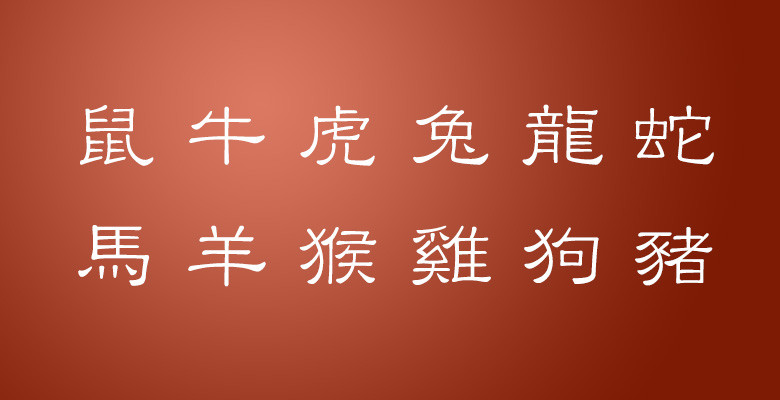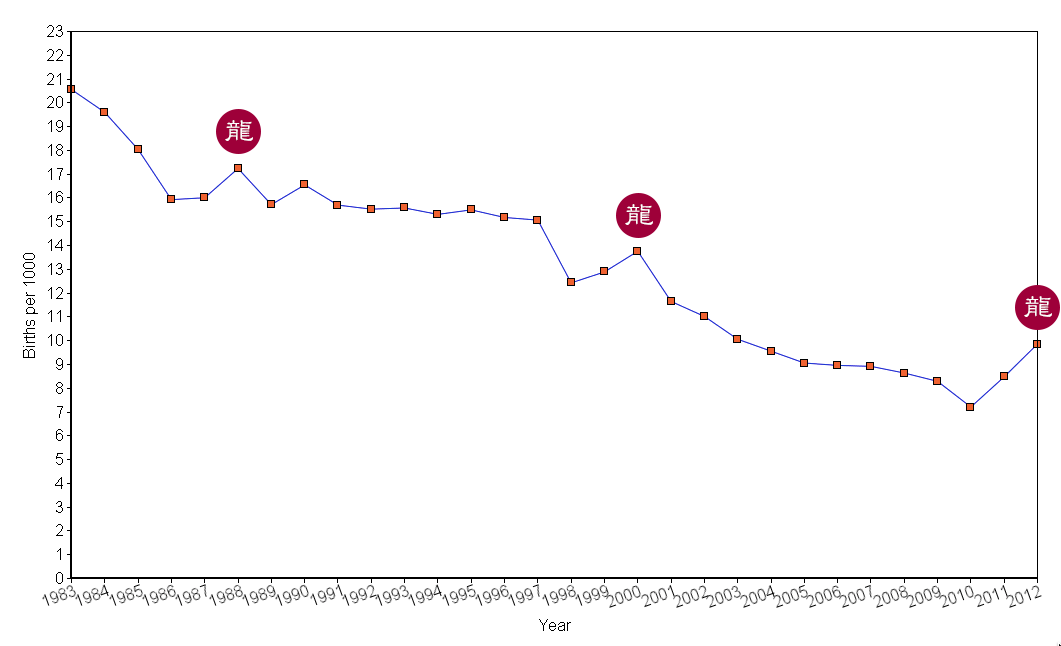
Sitting as Taiwan does somewhere along the transition from a traditional agricultural society to a modern technologically-developed nation, the superstitions of older times still hold a surprising amount of sway. From the harmless (not giving scissors or clocks as gifts) to decidedly less so (opinions on mental illness, and the burning of tons of carcinogens every auspicious day), Taiwan is still in the grip of a good deal of mumbo-jumbo.
Part of the background belief structure of the Han majority of Taiwan is the system often referred to as the “Chinese zodiac”, a twelve-year cycle of different animal signs, the characteristics of which supposedly affect the characters of the people born under those signs. The traditional order is Rat, Ox, Tiger, Rabbit, Snake, Horse, Goat, Monkey, Rooster, Dog, Pig, and the years follow the lunar calendar, so the current year of the Horse runs from January 31st 2014 to February 18th 2015.
The most auspicious sign is the Dragon. They are said to be assertive and powerful, to make good leaders, and to be successful in life. If you were having children, you might think to time the birth for a Dragon year if there is one coming up; indeed the birthrate shows an uptick every time a Dragon year comes around (1988, 2000, and 2012, marked on the chart with red circles and the character 龍 “dragon”).
Another immediately obvious point about that chart is the declining birthrate in Taiwan, a downward trend that has been evident since well before 1983, the first year recorded there. That’s a story for another time, but it’s striking how much—in modern, developed Taiwan no less—the influence of a folk superstition has on concrete issues like the number of children born in a given year.
The two other most widespread beliefs about these signs concern marriage and relationships. People born under the Tiger sign are usually barred from attending wedding ceremonies. The justification given is that Tigers are dogmatic people who create conflict; the last kind of guest you want at your wedding banquet. Having sat through a great number of interminable ceremonies accompanied by indigestible food, I have often cursed my luck at not being born in a Tiger year.
The matchmaking industry is still a big deal, and while its influence is waning, there are still many parents of children in their late twenties and early thirties who turn to matchmakers to try and provide a suitable husband or wife for their single child. The single most important duty of a son in the Confucian system (which still influences a lot of Taiwanese thought) is to father a son of his own, and thereby continue the family line. So little wonder that parents feel the need to push (gently or otherwise) their aging recalcitrant children into a fruitful marriage.
Many traditional matchmakers will spend a lot of time looking at the zodiac signs of prospective matches. There is a complicated pattern of compatibility between different signs; so while a Dog makes an ideal partner for a Horse, an Ox would make a disastrous mate. While many outsiders are aware of the twelve animals for twelve year cycles, the full system is much more complicated, with each person being born under four different animal signs (year, month, day, hour) and different influences (water, wood, earth, fire, metal). Much like the contrived nonsense of European astrology (Libra with Aquarius rising), this system is used to justify the existence of a class of specialists who can interpret all the combinations of signs provided to them, and make predictions about the best outcomes.
Fortune telling is still widespread in Taiwan, and is performed using all kinds of different systems, from counting the strokes in a person’s name to examining the features on their face. Bazi, or “eight characters” is probably the most widespread, and like the more focused divinations of the matchmakers, it uses the zodiac signs of the customer to make predictions and assertions.
So, if you’re tempted to draw the comparison between the Chinese zodiac and the newspaper horoscopes in the West, be careful. Nancy Reagan aside, the horoscope is nowadays often seen as a bit of harmless fun, a diverting way to pass five minutes on your commute to work. But here, the arrangement of the heavens has a very real impact on the everyday lives of many ordinary Taiwanese.

